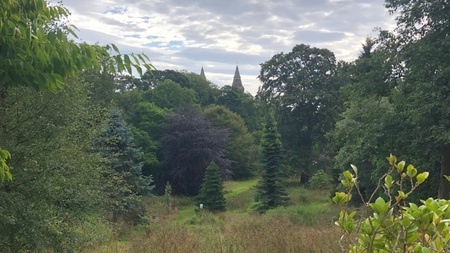A historic Aberdeen garden could play an important role in the development of urban green spaces, following a study that showed how different types of vegetation can be used to best manage these vital areas.
The study, which took place at the Cruickshank Botanic Garden at the University of Aberdeen’s Old Aberdeen campus, found that selecting the right type of vegetation when planning urban green spaces can play an important role in creating a flourishing local ecosystem while protecting our climate.
Urban green spaces are seen as vital to building resilience to both climate and land use changes, as well as helping achieve government targets aiming to increase green space provision to communities.
However, relatively little is known about how these should be designed to make the most of specific hydrological ecosystem services that help build resilience.
The study, led by a team from the University’s School of Geosciences, along with international collaborators, and funded by the Leverhulme Trust, analysed plots at the Cruickshank Botanic Gardens over one growing season to see how different vegetation types might affect what happened to rainfall.
They found that the use of grassland encouraged greater groundwater recharge, while conifers increased transpiration – the process where plant roots absorb water and then release it as vapour through leaves, one of the major sources of water being released into the atmosphere, which can help to cool the local air.
The results of the study, which was one of the first of its type in such an environment, is published in the journal Environmental Monitoring and Assessment
Lead author Dr Jamie Lee Stevenson said that urban green spaces are increasingly seen as important in building resilience to both climate and land use changes, making their study a potentially important resource for future green space design and planning.
He said: “The choice of urban green space vegetation is important in maximising specific ecosystem services such as groundwater recharge and the cooling of local air temperatures which can help mitigate and improve resilience against climate and land use change.
“In this study we used an array of sensors and developed a new modelling approach, comparing vegetation types at a plot scale, to see clearly how different vegetation types compare in terms of the derived ecosystem services they provide.
“The results provide clear, quantifiable, evidence of functional differences in a previously unstudied area that could be used by those managing urban green spaces for climate and land use change resilience. It also provides a sound basis for further studies in other urban environments and locations.”


